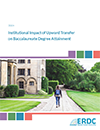Students follow multiple pathways to bachelor’s degree completion but the relative impacts of these different pathways is not well understood. This study seeks to disentangle factors relating to student persistence to graduation by controlling for both student and institutional factors. Using a mixed effects linear regression model on a matched dataset, this study had two main findings:
- Participation in upward transfer was found to negatively impact probability of graduation by between 9.3 percent and 12.1 percent. Students following this pathway are thus significantly less likely to graduate than their direct entry peers.
- The administrative data used in this analysis showed evidence of institutional bias and selection bias. These biases were shown not to substantially impact the relationship between upward transfer and graduation. However, they did produce measureable shifts in the magnitude of transfer impact estimates.
Several additional factors were analyzed to verify the validity of this research. The importance of these points applies only to this study but may speak to its context relative to other research in the literature.
- In general the variables representing demographics, financial aid, and educational experience related in similar ways to graduation as compared to findings in the literature. The exception to this is minority status and expected family contribution which had insignificant impact on graduation across all models.
- In the context of higher education research, when multiple institutions are being studied, there is reason to apply mixed effects modeling and/or propensity score matching to control for selection and survivorship bias.
- Potential bias introduced due to the specification of the sample, as well as missing data relating to student ability, may have reduced accuracy of estimates and merits further study.


